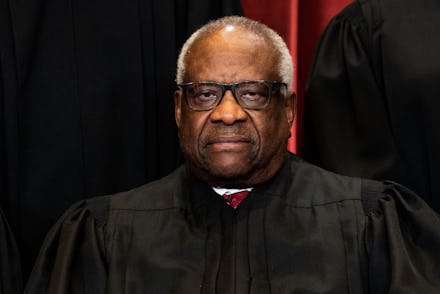Even Clarence Thomas, who roundly sucks, can see that federal pot laws are totally incoherent

The longer you spend online, the more likely it is that you'll end up quoting Clickhole's absolutely iconic "Heartbreaking, the Worst Person You Know Just Made A Great Point" blog with increasing regularity. I'm thinking of that blog today, because Supreme Court Justice Clarence Thomas — arguably the most conservative member of not only his court, but any court in the country — managed to sound unnervingly reasonable when writing about federal marijuana laws on Monday.
"Once comprehensive, the federal government's current approach is a half-in, half-out regime that simultaneously tolerates and forbids local use of marijuana," Thomas wrote in a statement accompanying a SCOTUS decision to deny an appeal from a Colorado-based medical cannabis dispensary. "This contradictory and unstable state of affairs strains basic principles of federalism and conceals traps for the unwary."
To be clear, Thomas would hardly be considered friend of Mary Jane, although he did admit during his nomination process to having smoked pot "several times" in college. He also wrote a stinging dissent in the 2005 Gonzales v. Raich case, arguing that contrary to the court's decision, the commerce clause of the Constitution does not give Congress the power to regulate medical marijuana grown and used in California, because "our federalist system, properly understood, allows California to decide for themselves how to safeguard the health and welfare of their citizens." The Raich decision ultimately gave Congress the authority to police medical marijuana despite state laws that may have legalized it.
Still, the obviously scattershot approach the federal government has taken toward legalized weed in dozens of states is so bizarre that even an arch-conservative like Thomas can see that something has to give. And so, in his statement Monday, Thomas admitted that:
The federal government's current approach to marijuana bears little resemblance to the watertight nationwide prohibition that a closely divided Court found necessary to justify the government's blanket prohibition in Raich. If the government is now content to allow states to act 'as laboratories' 'and try novel social and economic experiments,' then it might no longer have authority to intrude on '[t]he States' core police powers ... to define criminal law and to protect the health, safety, and welfare of their citizens.'"
Accordingly, Thomas concluded: "A prohibition on intrastate use or cultivation of marijuana may no longer be necessary or proper to support the federal government's piecemeal approach."
Put simply, Thomas argues, the disparity between states that have legalized cannabis, and the federal restrictions that still force dispensaries to, for example, deal largely in cash, are so bizarre and unevenly applied that perhaps it's time to start untangling some of those federal restrictions in the first place.
In part, this is hardly a shocking declaration from Thomas, whose conservativism frequently manifests in his steadfast opposition to federal overreach. But coming from Thomas in the midst of a major weed legalization boom across the country — and with some in the White House seeming open (if, as could probably have been expected, unevenly so) to the prospect of at least loosening the federal pot laws — it's a sign that the wave of states rushing to legalize (and then profit from) the growing marijuana industry is unlikely to slow down anytime soon.